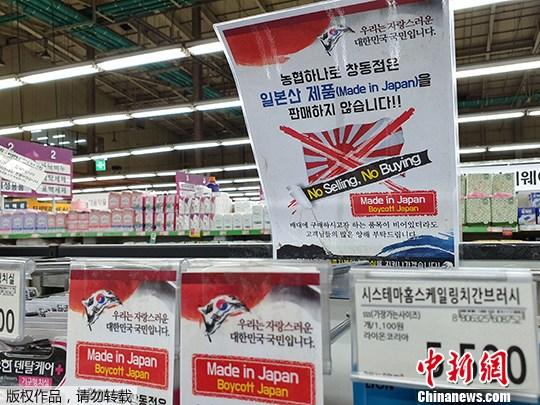China News Service, July 2nd, Kyodo News published on July 1st that Japan and South Korea's opposition to trade is long-term. As of 1st, Japan has indicated that it has been one year since it strengthened its export control to South Korea. Earlier, negotiations were conducted for the compromise, but South Korea asked the World Trade Organization (WTO) to restart the dispute settlement process in June, clearly showing a tough stance. The Japanese side called for dialogue, but no solution was found.
Figure: Korean people boycott Japanese goods.
The article is excerpted as follows:
In July 2019, Japan tightened the export control of three types of semiconductor materials, one of the major industries in South Korea, on the grounds of “discovery of export management problems related to South Korea”. In August, Japan excluded South Korea from "white list countries" that set preferential treatment in security export management.
The article points out that the Japanese side has adopted stricter controls at a time when the South Korean Supreme Court ordered Japanese companies to compensate in the original labor lawsuit, and bilateral relations have deteriorated. In this context, South Korea filed a lawsuit against the WTO in September 2019 on the grounds that the Japanese control was "discriminatory measures taken for political reasons".
In May 2020, South Korea requested the withdrawal of measures on the grounds that the problems of the management system had been resolved, and the Japanese side did not respond. South Korea therefore decided to restart the WTO procedures that had been interrupted previously.
On June 29, South Korean President Wen Zaiyin once again criticized export control as a "surprise" at the meeting. The Japanese side's position is that the measures are security adjustments and do not violate WTO agreements. At the press conference on June 30, Japan’s Minister of Economy and Industry Hijiki appealed: "Strongly request to stop the WTO process and return to the dialogue table."
The article finally pointed out that after August, South Korea will formally discuss whether to order the sale of assets of Japanese companies seized in the original labor lawsuit. The Japanese government intends to take retaliatory measures when companies suffer actual damage, and the relationship between the two countries may become more complicated.

